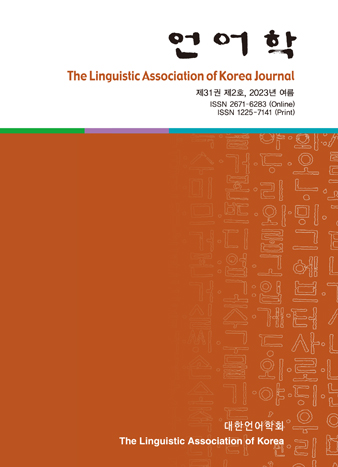대한언어학회 전자저널

31권 2호 (2023년 6월)
- The Relationship between Reading Test Strategy Use and Reading Self-Efficacy Sources of Uzbek EFL Learners
-
Gulnoza Salaeva, Jaewoo Shim & Heechul Lee
Pages : 123-143
Abstract
Salaeva, Gulnoza; Shim, Jaewoo & Lee, Heechul. (2023). The relationship between reading test strategy use and reading self-efficacy sources of Uzbek efl learners. The Linguistic Association of Korea Journal, 31(2), 123-143. The purpose of this study is to explore the relationship between the use of reading test strategies and reading self-efficacy beliefs among Uzbek EFL learners. The subject pool consisted of 266 Uzbek students who were taking IELTS preparation courses in language centers. Principal Component Analysis was used to reduce the dimensionality of the variables. Based on the students' use of reading test strategies, two clusters were identified using K-means cluster analysis. To determine the impact of the four sources of reading self-efficacy on differentiating the two groups of students, discriminant analysis was conducted. The findings revealed that 'enactive mastery experience' and 'verbal persuasion' played significant roles in distinguishing high and low users of reading test strategies, with the accuracy of 68.4%. The results suggest that Uzbek EFL learners need to enhance their reading self-efficacy in order to use reading test strategies effectively and improve their performance on reading tests.
Keywords
# reading test strategy use # four sources of reading self-efficacy
References
- Alderson, J. C. (2000). Assessing reading. Cambridge: Cambridge University Press.
- Alharbi, M. A. (2021). Self-efficacy sources and reading comprehension of L2 undergraduate learners. Journal of Language and Linguistic Studies, 17(2), 924-940. Doi: 10.52462/jlls.64
- Baker, L., & Wigfield, A. (1999). Dimensions of children\'s motivation for reading and their relations to reading activity and reading achievement. Journal of Educational Psychology, 91(1), 49-60. https://doi.org/10.1037/0022-0663.91.1.49
- Bandura, A. (1986). Social foundations of thought and action: A social cognitive theory. New Jersey: Prentice-Hall, Inc.
- Bandura, A. (1997). Self-efficacy: The exercise of control. New York: W.H. Freeman and Company.
- Bandura, A. (2006). Guide for constructing self-efficacy scales. In Pajares, F. & Urdan, T. (eds) Self –Efficacy Beliefs of Adolescents. Connecticut: Information Age Publishing, Inc.
- Brown, H. D. (2004). Language Assessment: Principles and Classroom Practices. Harlow, England: Longman, Pearson education Limited.
- Chamot, A. U., & O\'Malley, J. M. (1994). The effects of cognitive strategy instruction on the comprehension and recall of expository text. TESOL Quarterly, 28(4), 725-753.
- Cohen, A. D., & Upton, T. A. (2007). \"I want to go back to the text\": Response strategies on the reading subtest of the new TOEFL®. Language Testing, 24(2), 209-250. Doi: 10.1177/0265532207076 364
- Fong, C. J., & Krause, J. M. (2014). Lost confidence and potential: A mixed methods study of underachieving college students’ sources of self-efficacy. Social Psychology of Education, 17(2), 249-268. Doi: 10.1007/s11218-013-9239-1
- Ghonsooly, B., & Elahi, M. (2011). Learners\' Self-efficacy in Reading and its relation to Foreign Language Reading Anxiety and Reading Achievement. Journal of English Language Teaching and Learning Year, 53(217).
- Hair, J. F., Black, W. C., Babin, B. J., Anderson, R. E., & Tatham, R. L. (2006). Multivariate data analysis (6th ed.). Pearson Education.
- Hair, J. F., Black, W. C., Babin, B. J., & Anderson, R. E. (2019). Multivariate data analysis (8th ed.). Cengage Learning.
- Jolliffe, I. T. (2002). Principal component analysis (2nd ed.). New York: Springer.
- Mokhtari, K., & Sheorey, R. (2002). Measuring ESL students’ awareness of reading strategies. Journal of Developmental Education, 25(3), 2-10.
- Naseri, M., & Zaferanieh, E. (2012). The relationship between reading self-efficacy beliefs, reading strategy use and reading comprehension level of Iranian EFL learners. World Journal of Education, 2(2), 64-75.
- O\'Malley, J. M., & Chamot, A. U. (1990). Learning strategies in second language acquisition. Cambridge, MA: Cambridge University Press.
- Oxford, R. L. (1990). Language learning strategies: What every teacher should know. Newbury Park, CA: Newbury House Publishers.
- Pajares, F. (2003). Self-efficacy beliefs, motivation, and achievement in writing: A review of the literature. Reading & Writing Quarterly, 19(2), 139-158
- Rubin, J. (1975). What the \"good language learner\" can teach us. TESOL Quarterly, 9(1), 41-51.
- Saito, A. (2020). Strategy use, self-efficacy beliefs, and self-regulatedness in adult foreign language learning. Australian Journal of Applied Linguistics, 3(2), 152-167.
- Shehzad, M. W., Hamzah M. H. B., Alkurtehe, K. A., & Rawian R. M. (2019a). The role of self-efficacy beliefs in reading comprehension performance: A systematic review of the literature. International Journal of Innovation, Creativity and Change, 5(2), 1416-1465.
- Siew, M., & Wong, L. (2005). Language learning strategies and language self-efficacy: Investigating the relationship in Malaysia. Regional Language Centre Journal, 36(3), 245-269.
- Smith, E. V., Wakely, M. B., Kruif, R. E. L., & Swartz, C. W. (2003). Optimizing rating scales for self-efficacy (and other) research. Educational and Psychological Measurement, 63(3), 369-391.
- Tobing, I. R. A. (2013). The relationship of reading strategies and self-efficacy with the reading comprehension of high school students in Indonesia. (Doctoral dissertation) University of Kansas, Lawrence, KS. Retrieved from Proquest Dissertations and Theses Global. (Order No. 356735).
- Usher, E. L. (2009). Sources of middle school students’ self-efficacy in mathematics: A qualitative investigation. American Educational Research Journal, 46(1), 275-314. Doi: 10.3102/0002831208324517
- Weir, C. J., Hawkey, R., Green, A., & Devi, S. (2006) ‘The cognitive processes underlying the academic reading construct as measured by IELTS’, IELTS Research Project Report.
- Wilson, A., & Kim, W. (2016). The effects of concept mapping and academic self-efficacy on mastery goals and reading comprehension achievement. International Education Studies, 9(3), 12-23. Doi: 10.5539/ies.v9n3p12
- Yoğurtçu, K. (2013). The impact of self-efficacy perception on reading comprehension on academic achievement. Procedia-Social and Behavioral Sciences, 70(1), 375-386. Doi: 10.1016/j.sbspro.2013.01.075
- Zimmerman, B. J., & Schunk, D. H. (2001). Self-regulated learning and academic achievement: Theoretical perspectives (2nd ed.). Lawrence Erlbaum Associates